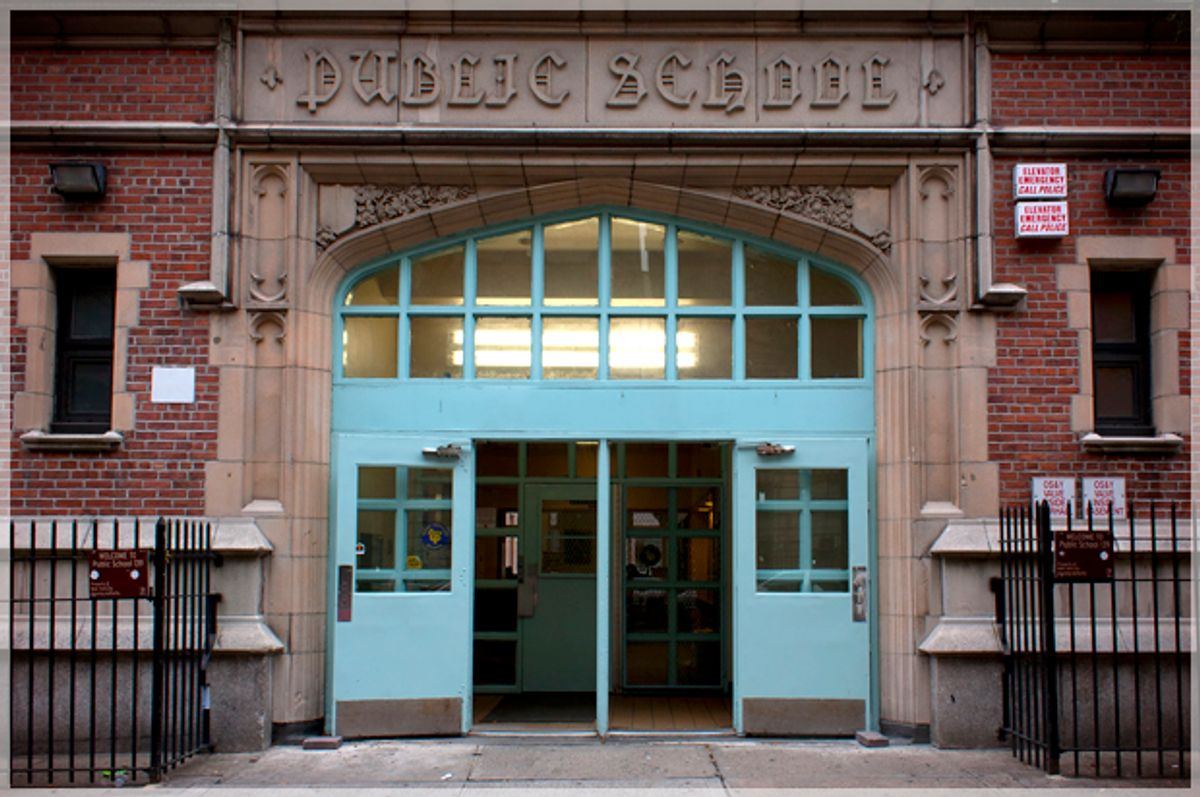Just over two years ago, my husband and I pulled our children out of private school and sent them into the wilds of public education. Now, as they settle into their third year in our neighborhood schools, we can confidently report the following: 1) Our public schools are more chaotic, more bureaucratically rigid, and far less nurturing and creative than the lovely little private school my children once attended; 2) our children are less academically challenged than they were in private school; 3) despite points 1 and 2, above, we’ll keep them where they are.
We left the private school system because we were stressed, in all kinds of ways. As soon as we stopped paying two private school tuitions, I was able to quit my second job and we stopped constantly worrying about money. We stopped driving half an hour twice a day, cursing rush hour, to get kids to school. Our neighborhood schools are minutes away. We were also able to step away from the activities arms race that seems part of the fabric of private school culture and that contains its own vocabulary of essentials for success: Suzuki, Kumon, Parkour, au pair.
Public school means that we, as a family, can relax.
Even so, the transition from private to public school was hard for all of us, parents and children alike. Private school dovetailed nicely with my tendency to coddle. Classes topped out at 16 students. If children struggled academically, teachers were on it, providing extra help and encouragement, before school, after school, at recess. And I liked (OK, loved) the sense that my kids were getting ahead, were receiving a better, faster, stronger education than other kids. In addition to foreign language immersion, they received excellent instruction in art and music. They had PE and worked in the school garden. Through the school’s hard work, every child was extraordinary: bilingual, chess playing, organic gardening savants.
Entering their new schools, my children’s classes of 10 became classes of 30. No one knew their names, no one greeted them each morning with cries of delight and with hugs. Instead, they lined up to enter school, and lined up again to go to class, to lunch, to recess. They got lost in their respective buildings. For the first half of sixth grade, our son Seth (I've changed my children's names to protect their privacy) also seemed to get lost in the system. There was so much emphasis on following directions and so little on thinking. He was finding the work easy but failing classes.
But then the kids found their way. Mary, who loves to be busy, joined a million after-school clubs – robotics, running, calligraphy. Seth, in perfect alignment with his personality, has enthusiastically joined almost nothing. He likes to observe and to provide commentary from the sidelines and has found others of his kind, a happy alliance of wisecracking middle school commentators.
It turns out that our children didn’t need to be one of a handful of precious kids in a classroom. They can handle the bigger classes, the dozens of children from different backgrounds. They can be OK and even, sometimes, great. We’ve learned that our kids aren’t so extraordinarily fragile that they need to be bubble wrapped by us before they venture into the world.
We’ve also learned that they aren’t necessarily extraordinary at all. Or, to be more precise, that if they want to be perceived as extraordinary in the public school system, they had better be extraordinary. The school will not create extraordinary for them.
We are lucky: The kids will receive a solid educational foundation in our local schools. And they can remain at that foundational level, or they can improve upon it. But it is up to them to take advantage of extra resources or to create those resources themselves. They have to be part of their own educational equation.
Seth will be entering a public high school with an international baccalaureate program, classes in Chinese, and the option to take courses at the local university if he is not sufficiently challenged. But he has to seek these experiences and he has to be qualified. His ability to take advantage of these opportunities is contingent on him, not on our ability to pay for a school that will automatically provide them.
Of course, down the road, we may regret this decision. We have to contend with the possibility that without the extra advantage that private school gives them, our children may no longer be considered super-special, super-educated, super-kids, zooming toward our version of their success. (“Yes, she’ll be at Yale next year. It just seemed a better fit than Harvard.”)
At least for now, keeping our children in public school, we’ve decided that maybe they don’t need to zoom after all. And we pay them the compliment of believing that they don’t need us, or their school, to be mapping their futures for them. This is better. This is just school. And my kids are just kids who get to handle their tiny piece of the world on their own.

Shares